CHICAGO– The future of filmmaking was on display at the 51st Chicago International Film Festival at the City & State Short Film program. Subtitled “Feel the Illinoise,” the collection included works by directors Bradley Bischoff, Joel Benjamin, Ed Flynn, Andy Berlin, Jake Zalutsky and Weija Ma.
As technology evolves, the short films are more masterfully created, either through student work or independent production. Some of the genres represented were animation, short documentary and examinations of the human condition. HollywoodChicago.com was there, talking to the young directors about the films that represent them.
 Bradley Bischoff, Director of “Nomad”
Bradley Bischoff, Director of “Nomad”
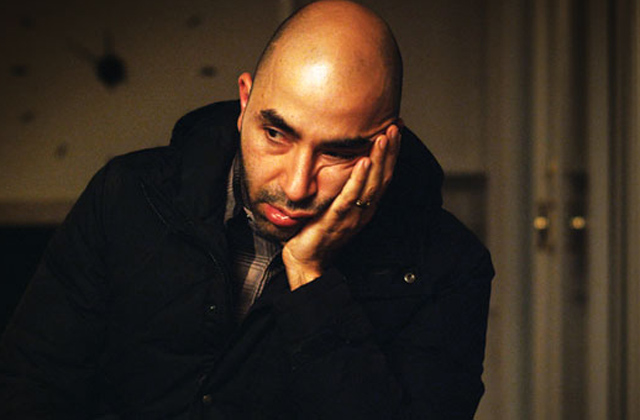
‘Nomad,’ Directed Bradley Biscoff
Photo credit: Chicago International Film Festival
“Nomad” is yet another notable submission from director Bradley Bischoff, a festival favorite from past years. The edgy psychosis in the film is in contrast to the seemingly normal couple having a gathering in their apartment. Surely there can’t be a breakdown in the middle of it all?
HollywoodChicago.com: You love mood and emotion in your films to create atmosphere. How does this match your application to everyday life?
Bradley Bischoff: What I would say about that is I went through a phase in my life where I wouldn’t take off my jacket or my shoes. It took me awhile to break that phase, I still only take them off at a unique point in the day. There are so many things I want to do and get it done, I just have a hard time sitting still.
HollywoodChicago.com: Within the context of ‘Nomad,’ how alone do you feel we are?
 Bradley Bischoff of ‘Nomad’ Photo credit: Patrick McDonald for HollywoodChicago.com |
Bischoff: Everybody has to fall asleep at night on their own terms, whether surrounded by people or living a single life, everybody falls asleep alone. I can only fall asleep if I’m satisfied with the decisions I have made that day. It’s not a weekly or monthly decision, it is that day. In that sense, everyday is a struggle to be honest with yourself, to be honest with what you’re doing in your life, to hit that pillow.
In the film, the main character wears his jacket, and takes it off only until he is connected with his wife. That informed me that he would sleep that night. The next morning he’s shirtless, having a cup of coffee, and f**k, it starts all over again. Every day is a challenge.
HollywoodChicago.com: When do you call ‘cut’ when you are directing…when you have what you want in the scene being shot in front of you, or beyond that barrier?
Bischoff: One of the big things I learned was when I was taking acting lessons in Los Angeles from Jeffrey Tambor. He made me consider the moment before the action and the moment after. That changed my life as a director. I will always roll early, and keep rolling afterward, to see what happens. What Tambor said was ‘I don’t have life figured out, how the hell can I have a movie figured out?’ In a film, we’re trying to recreate a life’s moment. There should be imperfections, there should be the ‘moment afterward.’
Often I will light another part of the set and shoot that, unbeknownst to the actors who are doing their lines elsewhere. Life is then happening, and if I did my job right, the actors will react accordingly, with a more honest portrayal. So I never say ‘cut’ too soon, it has to feel real.
 Joel Benjamin, Director of “Chasm”
Joel Benjamin, Director of “Chasm”
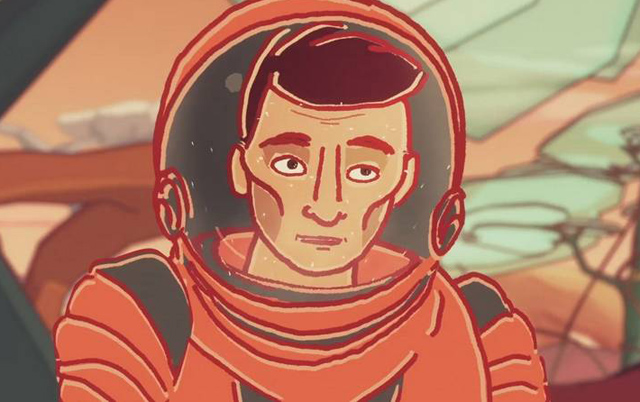
’Chasm,’ Directed by Joel Benjamin
Photo credit: Chicago International Film Festival
Joel Benjamin makes his second appearance in a row at the City and State program, with his particular view and style on animation. “Chasm” is a science fiction morality play set in outer space, which pits knowledge and technology versus the human determination of connection.
HollywoodChicago.com: What is different about ‘Chasm’ than any other animated film you’ve done, especially from last year’s ‘Drifting’?
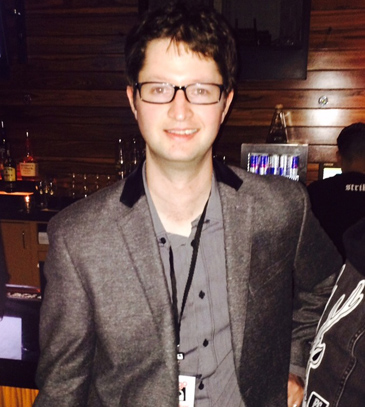 Joel Benjamin of ‘Chasm’ Photo credit: Patrick McDonald for HollywoodChicago.com |
Joel Benjamin: The biggest difference was that I worked with other people – as an independent animator I hadn’t done that much. So I got to bounce ideas off of other people, and it was fun to work through the challenge of creating different ideas.
HollywoodChicago.com: Since it was your original story, how did it evolve as you collaborated?
Benjamin: When Shelley Dotson [co-producer] and I began to work through the story – which is about an astronaut – we talked about how technology can be amazing, but you can still do a stupid thing like drop a screwdriver, and the amazing technology doesn’t matter anymore – that could be the end. We were figuring out how to make that basic story work, and it was a lot of fun with other people involved.
HollywoodChicago.com: The early movie projectors were called ‘The Magic Lantern.’ How does that magic lantern illuminate your path in filmmaking, and how does it continue to illuminate cinema in general?
Benjamin: Part of it is the recognition that other people want to tell stories as badly as I do, and that no matter what that story is about, if it’s good we can all relate to it. And that’s the best things about movies, we can escape into the reality of somebody else and relate to it.
 Ed Flynn, Director of “Unknown Unknown”
Ed Flynn, Director of “Unknown Unknown”
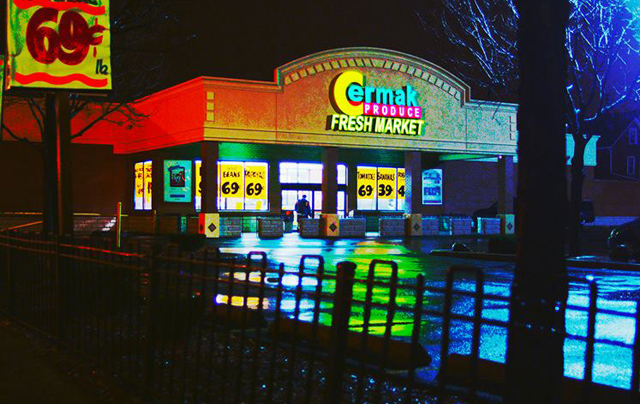
‘Unknown Unknown,’ Directed by Ed Flynn
Photo credit: Chicago International Film Festival
Ed Flynn’s “Unknown Unknown” was on of the more memorable short films in the program, an allegory set in a grocery store, under the glare of florescent lighting and unrealized dreams.
HollywoodChicago.com: Why did you cast yourself in the lead? Was it because of your deeper understanding and mood regarding the film, since you wrote it?
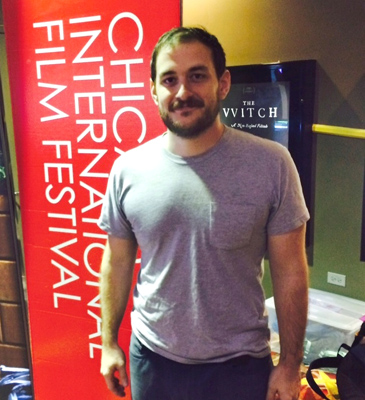 Ed Flynn of ‘Unknown Unknown’ Photo credit: Patrick McDonald for HollywoodChicago.com |
Ed Flynn: Well first, it was easier for me. I knew what that guy needed to do, just be impressionable and take it in. And second, it was practical. I have more experience as an actor than any other element of filmmaking. So I thought if I acted in it, maybe it would make up for what was lacking in the experience of my first film.
HollywoodChicago.com: Since your film was set in a grocery story, how do you feel these place feed our souls as much as supply our sustenance?
Flynn: A grocery store is this magic place, where we know there are several levels of function going on. There is a presentation going on, and there are less-than-savory things going on behind that presentation, that allows for the pretty, well-lit and colorful label thing possible. The grocery store was a good place to explore levels of things we notice, and levels we don’t notice, which was the basis for my film.
HollywoodChicago.com: Which film seems so close to your style, that it would almost seem as if you’d made it?
Flynn: The movies that I watch that are tied up into what I do in film are ‘Nashville,’ ‘The Shining’ – which played a big role in ‘Unknown Unknown.’ as you might guess – and the early short films of comedian Louis C.K., even before his TV series. And also, Robert Downey Sr., and his film ‘Putney Swope.’ They all give you the feeling that you can do anything.
 Andy Berlin, Director of “Marlene”
Andy Berlin, Director of “Marlene”

’Marlene,’ Directed by Andy Berlin
Photo credit: Chicago International Film Festival
“Marlene” is a stark, documentary-like narrative about a young woman getting some ominous news, and how it affects her path through life.
HollywoodChicago.com: What is the origin behind the idea for your film?
 Andy Berlin of ‘Marlene’ Photo credit: Patrick McDonald for HollywoodChicago.com |
Andy Berlin: Originally the idea came from my irrational fear of death, and how I would react if directly confronted with it. The script I began to write evolved into a separate character that wasn’t me.
HollywoodChicago.com: What was behind the decision to cast the role as an African American woman?
Berlin: She was just a great actress, my casting director showed me her web series, and the timing was right because I wanted to work with a woman in the lead. Someone had challenged me years before that I couldn’t write a woman like myself – as I mentioned this started as an autobiographical piece – and that frustrated me. Sure there are social and cultural differences between men and women, but at our core we’re all human beings, and we all have the same fears.
HollywoodChicago.com: Which film seems so close to your style, that it would almost seem as if you’d made it?
Berlin: What is very close to my heart, and the type of film that feels closest to my style, is Agnés Varda’s ‘Cleo from 5 to 7.’ It’s about a woman who is worried that she might have cancer. It was very influential for my film, and a big influence on my film style in general – that you can stretch out time and focus on actors, and how they actually feel about things. I relate to that, so definitely that is the one.
 Jake Zalutsky and Nick Santore, Director and Subject of “Nick Santore”
Jake Zalutsky and Nick Santore, Director and Subject of “Nick Santore”

’Nick Santore,’ Directed by Jake Zalutsky
Photo credit: Chicago International Film Festival
“Nick Santore” is a think-piece documentary about family and memory, as father and son – both named Nick Santore – try to work out the process of their relationship at a point in which the father is relying more on his adult son.
HollywoodChicago.com: In the context of your film, what do you both feel are main dynamics of a relationship between an adult son and a father?
Jake Zalutsky: For me, the core of the film was distilling what wasn’t unique about their relationship, in a broader context. What is the relationship we have with our parents at a certain point? What exists that connects us between generations. Besides children and parents need to get along, there is something else that connects us. The goal of the film is to reach that unattainable core of that connection.
 Jake Zalutsky & Nick Santore of ‘Nick Santore’ Photo credit: Patrick McDonald for HollywoodChicago.com |
Nick Santore: For me, it was realization and discovery. How at a certain point in my life, I can be with and talk to my parents at the same level as I am now. I wanted to bring it to another level, to get into it. Once you get into those types of conversations, you feel things that you didn’t know about, and you have those conversations to get there.
HollywoodChicago.com: What truth did you discover most about Nick Santore?
Zalutsky: They are just two people trying to get along with other, I don’t think there is a grand truth beyond that. Like all fathers and sons, they are bonded together in a certain way, that can be confusing, complex and hard to figure out. That’s what I was trying to get to in the film.
Santore: My father was just the man I thought he was.
HollywoodChicago.com: What is the most personal element of yourselves that we find in the film?
Zalutsky: Even in doing a documentary that is outside in, there is something personal that resides in me in some way. I have my relationship with my parents, and in making this connective film with Nick and his father, I learned a little bit about my own relationship with my parents, and have worked through it.
Santore: Figuring out relationships, that is what it was for me, beyond just my father. It was about friendships, romantic attachments and relationships with relatives, how do we mend them, get around them, and grow within them? By having these conversations with my father, I was able to do that. It gave us a way to put things out there, get through it, and figure it out for ourselves.
 Weijia Ma, Director of “The Same River Twice”
Weijia Ma, Director of “The Same River Twice”

‘The Same River Twice,’ Directed by Weijia Ma
Photo credit: Chicago International Film Festival
Director Weijia Ma has created a tone and emotion poem to her father in this sumptuously animated film. The 51st Chicago International Film Festival recognized this on Awards Night, honoring Ma with a Gold Plaque in the “Short Film, Animated” category.
HollywoodChicago.com: What was most impressive in your film was the emotional tone. How did you convert feelings and emotional tone into the animated result?
 Weijia Ma of ‘The Same River Twice’ Photo credit: Patrick McDonald for HollywoodChicago.com |
Weijia Ma: It took me a long time to figure out what to do. It began as a portrait of my father, which people were discouraging me from doing, especially in the context of the accident scene in the film – they were just assuming that it was about a girl whose father passed away. When he survived, they then figured it wasn’t about that. [laughs] Everything is normal, and nothing really happened again. I wanted to trick the audience. There are things that change in your life, and other points that don’t change. Life goes on.
HollywoodChicago.com: Was was your father’s critical view of his animated profile?
Ma: He didn’t really know the story of the piece. I did ask him to play the harmonica for it, and do the voices, and he was fine with it. His reaction after he saw the finished piece was, ‘I guess this means the audiences will know all the stories about me, right?’ I said, “I guess, yes.’ [laughs]
HollywoodChicago.com: When you talk about your love for filmmaking or animation, what is the first thing you talk about?
Ma: I came from China, and this was my graduate film from the School of the Art Institute in Chicago. I first studied animation in Bejing, and I learned a lot of traditional skills of animation there. The basis for my love of animation is that I wanted to tell a story, but it took awhile to figure out what kind of story I wanted to tell. As I learned more about it here, I feel animation is a medium that has so many possibilities, and I want to explore all the methods within it.
 | By PATRICK McDONALD |


















